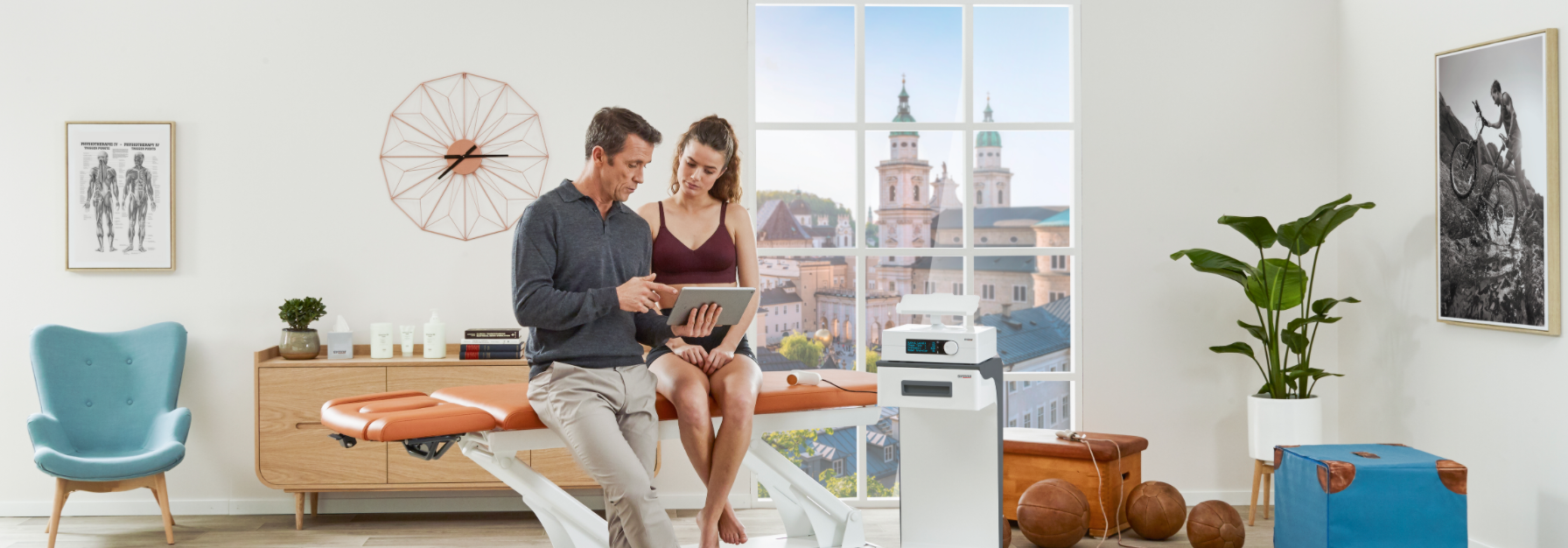When I grow up, I want to be... a physiotherapist!
Why should you not want to have the best job in the world?

We meet many therapists, not unusual for a company that specialises in products for physiotherapy. What they all have in common is their passion for people’s wellbeing. We understand that passion and in this article we would like to highlight what the physiotherapy study programme looks like and what you will learn. We will give you an insight on why YOU should aspire to be a therapist and what it takes to become one.
The job
Physiotherapists play an essential part in overall healthcare and their job is much more complex than just massage- and physical therapy. They should be able to analyse patient’s limitations and design the best possible treatment plan for every single patient, they evaluate the success of treatment plans and advise their patients. They help patients maximising quality of life and look at health promotion and prevention.
Another part of the job is the further development of rehabilitation procedures, as new research and therapy methods need to be explored. Thanks to the academic study programme, there is space in teaching, research and management.
Why should you not want to have the best job in the world?
Physiotherapy is all about working with people and treating them through movement and exercise.
- If you think the human body is the most interesting object there is and engaging and interacting with people is one of your strengths.
- If movement and exercise in others is key and you are not afraid of a bit of exercise yourself.
- If you are not afraid to diagnose and to look for the best possible remedy for a movement or functional ability problem.
- Or, maybe you are interested in researching existing or new therapies?
Then physiotherapy should be your choice!
What does the physiotherapy study programme look like in most countries?
Study programmes differ from country to country, however in countries where the program is at university level the study takes 4 years. Scientific, medical and technical basics are at the focus of your study; you will also learn about scientific and evidence-based work. Your syllabus will include modules like maths in medicine, fundamentals of scientific work, healthcare and prevention, biometrics, technology in medicine and physiotherapy, biomechanical and physiotherapy treatments, in some countries even a specialised English language course, communication training and psychology. Scientific research will no longer hold any secrets for you. Concepts used in research are explained, you will learn what types of research exist and you will delve into statistics. Divided into clear modules, the study program includes a biomedical sciences module, a motor skills module, a therapeutic skills module and your specialisation.
Biomedical Sciences
What does the human body look like and how does it work? To understand everything you need to know about the human body you are taught human anatomy, biomechanics, biology and chemistry. You will apply this knowledge to understand how movement affects the functioning of the human body and investigate this in the broader context of health and rehabilitation. You will learn everything about human organs and metabolism.
After the introduction to biomechanical concepts such as strength, momentum, balance-, you will apply this to physiotherapy and rehabilitation.
Motor Skills
You will work on your motor skills and perfect your movements enabling you to teach patients. Focus is not on performance, but on recognizing whether the body is used correctly. You will, for example take a deep dive into how motor skills are taught to children, starting from birth. You will learn how to build up and maintain your own condition, enabling you to teach this to your future patients. Rhythmic and aquatic activities will be used to train body awareness, motor skills and core stability. You will learn how to set up training programmes, mixing and combining physical exercises that best suit your patients, for them to safely return to the activities of daily life.
Therapeutic Skills
Step by step, you will develop your therapeutic skills and learn to examine your patients, set up, implement and evaluate their treatment plans. Communication abilities are also an important part of your therapeutic skills, because correct and appropriate communication with your patient is key. You understand that you are part of a wider healthcare network and if necessary, you know which other disciplines should be looking at your patient’s wellbeing. Everything you do is based on clinical reasoning and the correct use of your medical knowledge.
Specialisations
Based on an internship you will have the opportunity to choose your specialisation, that can be:
- Rehabilitation and physiotherapy of patients with internal diseases (organs, cancer, diabetes)
- Rehabilitation and physiotherapy of patients with neurological disorders (brain, spinal cord, Parkinson, MS and prostheses)
- Rehabilitation and physiotherapy of patients with musculoskeletal disorders (sports -and manual therapy)
- Rehabilitation of the elderly (to improve physical autonomy and prevent falls)
- Rehabilitation of paediatric patients (children under 16 years of age with musculoskeletal and neuro-orthopaedic conditions)
After the completion of your study programme, you will have the opportunity to use your knowledge and find employment in a variety of places:
- Rehabilitation centres
- Physiotherapy practices
- Research facilities
- Schools and universities
- Medical care centres
- Health insurances (medical officer)
Enough opportunities for an intelligent and passionate person like yourself.
